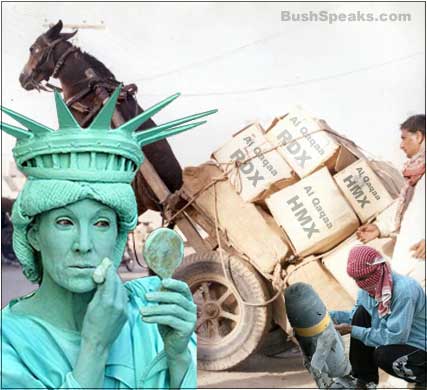October 29, 2004
It's Not Just Al Qaqaa
By PAUL KRUGMAN, New York Times OP-ED COLUMNIST

Just in case, the right is already explaining away President Bush's defeat: it's all the fault of the "liberal media," particularly The New York Times, which, so the conspiracy theory goes, deliberately timed its report on the looted Al Qaqaa explosives - a report all the more dastardly because it was true - for the week before the election.
It's remarkable that the right-wingers who dominate cable news and talk radio are still complaining about a liberal stranglehold over the media. But, that absurdity aside, they're missing a crucial point: Al Qaqaa is hardly the only tale of incompetence and mendacity to break to the surface in the last few days. Here's a quick look at some of the others:
Letting Osama get away Just before the story about Al Qaqaa broke, the Bush-Cheney campaign was frantically trying to debunk John Kerry's statement that Mr. Bush let Osama bin Laden get away when he was cornered at Tora Bora. That getaway, Mr. Kerry asserts, was possible because the administration "outsourced" the job of closing off escape routes to local Afghan warlords.

In response, Gen. Tommy Franks claimed that we don't know that Osama was at Tora Bora, and, anyway, we didn't outsource the work of catching him. Dick Cheney called Mr. Kerry's claims "absolute garbage." But multiple reports from 2001 and early 2002 confirm Mr. Kerry's version. As Peter Bergen, a terrorism expert, writes, Mr. Kerry's charge is "an accurate reflection of the historical record."
Letting Zarqawi get away On Monday The Wall Street Journal confirmed an earlier report that in 2002 the military drew up plans for a strike on the base of the terrorist leader Abu Musab al-Zarqawi in an area of Iraq not under Saddam's control. But civilian officials vetoed the attack - probably because they thought it might undermine political support for the war against Saddam. So Mr. Zarqawi, like Osama, was given the chance to kill another day.
The situation in Iraq Dick Cheney is telling supporters that Iraq is a "remarkable success story." But the news from Iraq just keeps getting worse. After 49 Iraqi National Guard recruits were killed, execution style, even Ayad Allawi, the Iraqi prime minister - who usually acts as a de facto spokesman for the Bush-Cheney campaign - accused coalition forces of "gross negligence." It's now clear that the insurgency is much larger than U.S. officials initially acknowledged, and that Iraqi security forces have been heavily infiltrated.
$70 billion more Earlier this week The Washington Post reported that administration officials were planning to seek an additional $70 billion for Iraq and Afghanistan after the election. Whatever the precise number, it has long been obvious to knowledgeable observers that this was coming, but the news will come as a shock to many people who still don't realize how deep a quagmire Mr. Bush has gotten us into.
All of these stories would be getting more play right now if it weren't for the Al Qaqaa mess. Still, one can understand why the right is so upset.
After all, Al Qaqaa illustrates in a particularly graphic way the failures of Mr. Bush's national security leadership. U.S. soldiers passed through Al Qaqaa, a crucial munitions dump, but were never told that it was important to secure the site. If administration officials object that they couldn't have spared enough troops to guard the site, they're admitting that they went in without enough troops. And the fact that these explosives fell into unknown hands is a perfect example of how the Iraq war has worsened the terrorist threat.
The story of Al Qaqaa has brought out the worst in a campaign dedicated to the proposition that the president is infallible - and that it's always someone else's fault when things go wrong. Here's what Rudy Giuliani said yesterday: "No matter how you try to blame it on the president, the actual responsibility for it really would be for the troops that were there. Did they search carefully enough?" Support the troops!
But worst of all from the right's point of view, Al Qaqaa has disrupted the campaign's media strategy. Karl Rove clearly planned to turn the final days of the campaign into a series of "global test" moments - taking something Mr. Kerry said and distorting its meaning, then generating pseudo-controversies that dominate the airwaves. Instead, the news media have spent the last few days discussing substance. And that's very bad news for Mr. Bush.